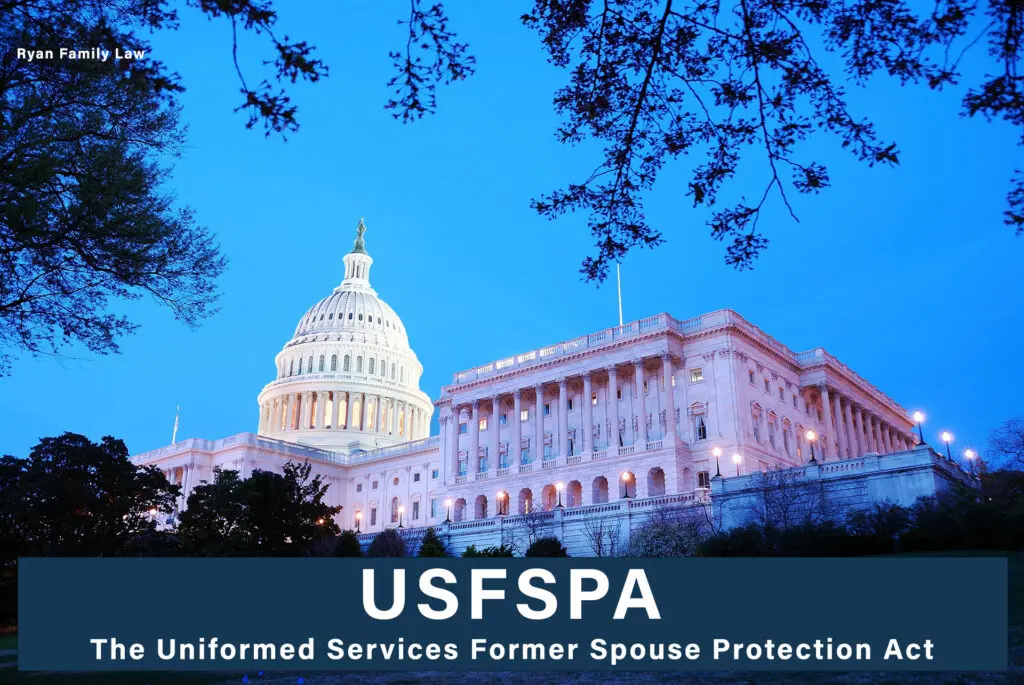The Uniformed Services Former Spouse Act
The Uniformed Services Former Spouse Act is a federal law that provides benefits to ex-spouses of service members, such as part of a military member’s retirement benefits, medical care, and exchange/commissary benefits.
The Uniformed Services Former Spouse Protection Act provides qualifying spouses with the following protections:
- Allows for the division of retirement pay between service members and ex-spouses
- Allows ex-spouses to receive direct payment of military pay from the government
- Allows ex-spouses to receive health care at military facilities
- Allows ex-spouses to shop at military exchanges and commissaries
- Allows victims of spousal or child abuse access to military benefits
The law, however, does not do the following:
- It does not compel courts to divide military retirement benefits
- It does not include a formula for dividing payment
- It does not grant a preset share of military retirement pay
- It does not limit the percentage of disposable pay available to ex-spouses
- It does require an overlap of military service and marriage to divide retirement pay
Jurisdiction Under The USFSPA
Civilian courts are forbidden from treating military retirement pay as community property unless the court has jurisdiction over the service member under certain circumstances.
Courts have jurisdiction based on a service member’s:
- Residence aside from military housing
- Domicile
- Consent to the court’s jurisdiction
The division of retirement pay as community property is only possible when the ex-spouse was married to the service member for 10+ years, and the service member completed 10 years of service during the marriage.
Direct Payment Of Retired Pay After A Military Divorce
Some spouses can receive payment directly from the government if a divorce order or settlement has been ratified or approved by the court. However, direct pay must be used or provided under certain circumstances—pay can be directly disbursed if it is for child support, alimony, or the division of retired pay as property.
Payment will continue until any of the following events occur:
- The court’s terms are satisfied
- The retired service member dies
- The ex-spouse dies
How To Request Direct Pay For Military Divorce
If you qualify for direct payment from military pay centers for your ex-spouse’s retirement income, here’s how you file a request. First, you need to fill out DD Form 2293, or the “Application for Former Spouse Payments from Retired Pay.”
You’ll also need:
- A copy of the court order
- Documents calling for the payment of child support/alimony/property division
Your accompanying documents must have been certified by a court officer or judge within the last 90 days. You can send your application to the relevant office by regular or certified mail, email, or fax. Within 30 days of receipt, the Defense Finance & Accounting Service should notify your ex-spouse, consider any response received, or reject your request if it doesn’t meet the standards for direct pay.
The DFAS may also ignore the court order if it has been demonstrated as defective, modified, set aside, or another order has superseded it. You should receive notification of your payment, or an explanation of why the direct payment request was rejected.
The USFSPA & Survivor Benefit Plan Designation
USFSPA
The USFSPA allows ex-spouses to retain their designation under the Survivor Benefit Plan after divorce, as long as they meet certain criteria. For one, the designation must either be voluntary or ordered by the court. In cases where the military divorce occurred after retirement, plan coverage will be equal for both spouses. If military divorce occurred before retirement, then the court order will determine coverage.

The USFSPA allows ex-spouses to retain their designation under the Survivor Benefit Plan after divorce, as long as they meet certain criteria. For one, the designation must either be voluntary or ordered by the court. In cases where the military divorce occurred after retirement, plan coverage will be equal for both spouses. If military divorce occurred before retirement, then the court order will determine coverage.
If a civilian beneficiary remarries before age 55, they lose plan eligibility for as long as the new marriage lasts. If the new marriage ends, their coverage is reinstated.
Schedule Your Free Case Evaluation With A Military Divorce Lawyer
We offer a free case evaluation for our prospective clients and have offices conveniently located throughout San Diego County and for Northern California residents from our Contra Costa County office in Walnut Creek, CA. If you have any questions about our representation or your federal civil service or military divorce options, then contact Paul J. Ryan today.
